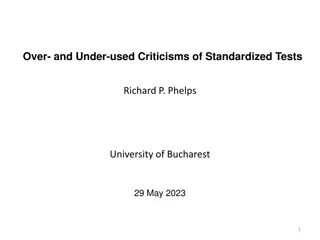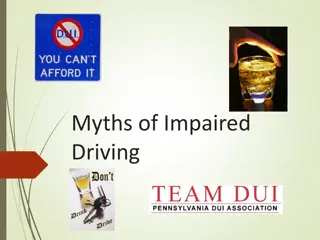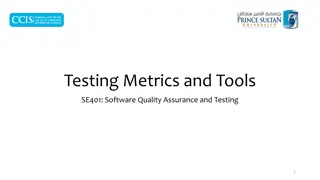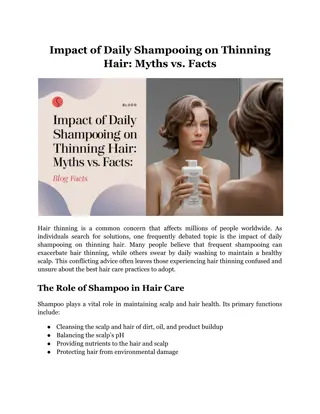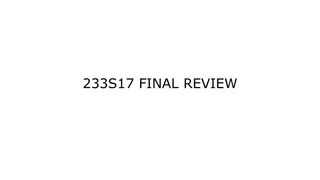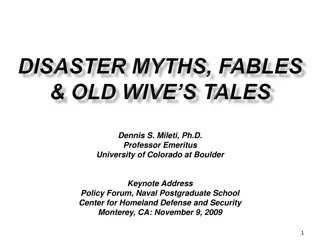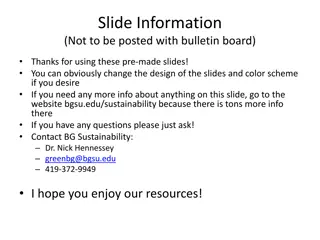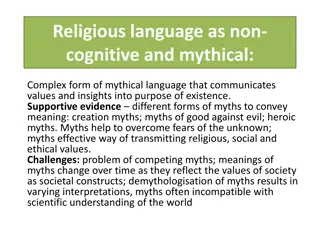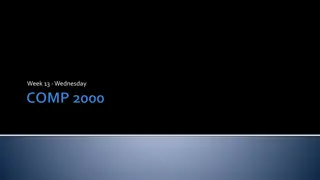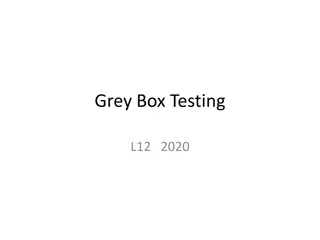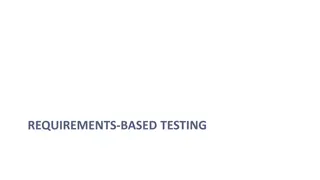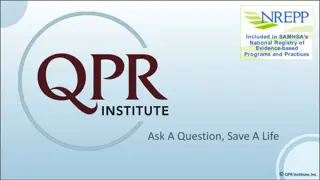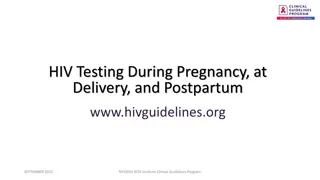Understanding Standardized Testing: Facts, Myths, and Strategies
Criticism of standardized testing is a long-standing issue. This research team delves into the world of standardized tests such as ACT, SAT, GMAT, GRE, and PRAXIS exams to explore their impact on student success. They investigate the necessity of standardized testing, factors affecting performance, and strategies to enhance scores. Through a comprehensive study, the team aims to debunk myths, identify key influencing factors, and provide effective test-taking tips to boost student performance.
Download Presentation

Please find below an Image/Link to download the presentation.
The content on the website is provided AS IS for your information and personal use only. It may not be sold, licensed, or shared on other websites without obtaining consent from the author. Download presentation by click this link. If you encounter any issues during the download, it is possible that the publisher has removed the file from their server.
E N D
Presentation Transcript
+ Facts and Fictions About Standardized Testing 2015-2016 Mathematics Education Team Principal Investigator: Dr. Linda B Hayden Mentor: Dr. Cheryl J Lewis Members: Cameron Bernado, Jessica Hathaway, Joselyn Hathaway
+Abstract Criticism of standardized tests is nothing new [1]. Banesh Hoffman, professor of mathematics and former collaborator with Albert Einstein, made exactly this point in his 2003 book The Tyranny of Testing . Some standardize test have been found to be culturally bias, and have not necessarily been an accurate predictor of student success in undergraduate or graduate school. Due to these concerns, testing companies, colleges/universities, and test-takers are seeking ways to level the playing field. As a result, several questions have been raised: 1) Is standardized testing really necessary and can these tests truly predict ones success in their academic career and/or profession? 2) What are the characteristics of people who do well or poorly on these tests? 3) Is there a magical formula to passing a standardized test? 4) Has research proved that certain test-taking strategies are more effective than others? 5) Are there campus/institution practices/interventions that can be used to successfully address problem areas and/or to close achievement gaps? This group of researchers examined various test-taking techniques and tips, as a means to identify, select, and/or reject common test-prep endorsements that will aid to the enhancement of one s success rate on test day. There has been a number of studies conducted that have been very effective in improving the test scores of individuals who are taking standardized testing (such as the SAT, ACT, PRAXIS, GMAT, and GRE).
+Introduction In the spring of 2016, the URE mathematics research team from the Center of Excellence in Remote Sensing Education and Research program at Elizabeth City State University, initially began its study by familiarizing themselves with the content area of various standardized test (such as the ACT, SAT, GMAT, GRE, and PRAXIS exams), followed by probing for what colleges/universities, local education agencies (LEAs), State Department of Instructions, other governmental agencies and employers may consider to be a passing/recommended test score for each of these exams. Still further, these researchers reviewed an array of sources to determine both pros and cons about standardized testing. Finally, this group searched for effective test-taking techniques and strategies to assist test takers in enhancing their standardized test scores.
+Objectives The purpose of this study is three-fold: 1. To define what is standardized testing and to identify facts & myths about standardized testing 2. To describe some of the factors that have been noted as factors that can influence standardized testing performance 3. To identify tips/strategies (if any) that can improve students performance on standardized tests
+Research Questions What is standardized testing? 1. Is standardized testing really necessary and can these test truly predict ones success in their academic career and/or profession? 2. What are the characteristics of people who do well or poorly on these tests? 3. Is there a magical formula to passing a standardized test? 4. Has research proved that certain test-taking strategies are more effective than others? 5. Are there campus/institution practices/interventions that can be used to successfully address problem areas and/or to clo achievement gaps? 6.
+What is standardized testing? According to US Legal.com, standardized testing is a test administered and scored in a consistent or standard manner A well designed standardized test provides an assessment of an individual s mastery of a domain of knowledge or skill
+The Necessity of Standardized Tests Used to be evaluated for admissions into undergraduate, graduate, or professional programs Easy way for some colleges/universities to weed out applicants These tests are not accurate because: 1. The creator of the test assumes everyone thinks the same way when answering the questions 2. Graders fails to look at the test takers point of view aside from their own 3. Test takers may have test anxiety and cannot perform at their highest potential
+Characteristics of Test-takers Those who did well on standardized tests included: Upper-class, white (European-American) students Due to abundance of resources and the motivation to learn Their environment and those surrounding them have an influence Those who didn't t do well on standardized tests included: Lower-class, black (African-American) students Lacked the funding or resources for materials needed for further learning The environment included poor public school districts
+Magical Formula The question has been raised, are there secret ingredients used for passing standardized tests? NO There are tips and strategies that students can use to help them approach questions productively There are free versions of standardized tests, which is the most effective Study early Understand how the test scored Answer the easier questions first and go back if you have time Get plenty of rest
+Institutional Practices/Interventions Bowie State University PRAXIS Lab- increases awareness of issues in teaching PLATO- web based interactive assessment and preparation for PRAXIS 1 Education course 220- 3 credit class that prepares students for the PRAXIS 1 Educational Testing Service- peer tutoring available at BSU s library
+Institutional Practices/Interventions (continued ) Elizabeth City State University Online Writing Lab (OWL)- available for all students; writing techniques are critiqued and perfected by English majors and professors SAT workshops and senior seminars- available to students tear round Vouchers- given to students that are not able to pay for the test themselves Model Scholars- helps students, that scored low on the SAT, get into ECSU by taking summer courses for class credit
+Institutional Practices/Interventions (continued ) Delaware State University Scholar Teacher Education Program (STEP Scholarship) covers tuition and fees (PRAXIS is not required) Individualized Instructional Preparation in Education (EDUC 000) Enhances reading, writing, math, speech, and test-taking strategies 2 credit hours Similar to a GE course because it doesn t fulfill degree requirements
+Institutional Practices/Interventions (continued ) Norfolk State University Provide websites, YouTube videos, seminars, and courses to assist students with preparing for standardized tests Encourage effective time management Test Preparation Guide- designed to assist students in developing the competencies needed to reason Also offers where and how to find sample test items
+Methodology Analysis of four HBCU Peer Institutions to see if the standardized testing facts and fiction were applicable Data consisted of a list of variables: 1. Total student enrollment 2. Percentage of Pell Grant Recipients 3. Average combined SAT scores for incoming freshmen 4. Average GPA of incoming freshmen 5. Total # of incoming first time, full time freshmen 6. 1styear retention rates, first time
+Results Pell Grant Percentages 80% This chart displays the percentage of Pell Grant recipients for the four HBCU s researched over a four-year period. ECSU has a 72% average for Pell Grant recipients; BSU s Pell Grant recipient average was 50%. While DSU s Pell Grant recipient s average is 52%, NSU s average is 64%. It was observed that ECSU s percentage was the highest of the four HBCU s and BSU s percentage was the lowest. 70% 60% Elizabeth City State University 50% Bowie State University 40% Delaware State University 30% Norfolk State University 20% 10% 0% 2010 2011 2012 2013
+Results (continued) SAT Combined Averages 1100 This chart shows the results of SAT scores for the researched HBCU s over a four-year period. ECSU s average SAT score was 852 out of 2400 while BSU s average was 862. DSU s average was 955 and NSU s average was 886. 1000 900 800 Elizabeth City State University 700 600 Bowie State University 500 Delaware State University 400 Norfolk State University 300 200 100 0 2010 2011 2012 2013 2014
+Results (continued) 1st Year Retention Rates 90% This chart displays the results of first year retention rates from the four HBCU s researched. ECSU has the highest retention rate, which was 76%. BSU and NSU have a common average of 71% and DSU has the lowest average of 65%. 80% 70% 60% Elizabeth City State University 50% Bowie State University Delaware State University 40% Norfolk State University 30% 20% 10% 0% 2010 2011 2012 2013 2014
+Results (continued) Chi-Squared Retention Rates This chi square was performed to see if SAT test scores have any impact on retention rates, because ETS finds that to be true. That statement is a myth because students with low SAT scores still have the potential to be successful. Retention Rate Statistics Statistic DF Value Probability Chi- Square 12 2.2006 0.999 Chi-Squared SAT Scores SAT Scores Statistic DF Value Probability Chi- Square 9 11.6252 0.2353
+Future Work Examine exemplary programs that have been proven to enhance standardized testing scores beginning with K-12 through graduate and professional school. Investigate the success rates (test scores, promotion rates, retention rates, graduation rates) of students enrolled in these exemplary programs. Determine whether there is any significant difference in the success rates of participants based on their gender, race, and socio-economic status.
+Acknowledgements Dr. Linda B. Hayden who has provided the funding for this research project Dr. Cheryl J. Lewis for her guidance, input, and support throughout the duration of this project Dr. Patterson for technical assistance and support Mr. Brian Jordan, Program Specialist, Office of Institutional Effectiveness, Research, and Assessment for his assistance in our statistical data analysis Dr. Sheila H. Williams, Director of Teacher Education & School Partnership for her candidness regarding the pros & pitfalls of Test-takers of the PRAXIS exam at Elizabeth City State University and other HBCU s
+References B. Hoffmann, The Tyranny of Testing. Mineola, N.Y.: Dover Publications, 2003. Standardized Test Education Law & Legal Definition,definitions.uslegal.com/s/.standardized-test- education/, March 15, 2016. C. Carter, Case Against Standardized Tests (1999), Testshttp://testcritic.homestead.com./standardizedtesting/. Accessed: March 1, 2016. L. Sheu, S. Dada, Impact of Household Income on Standardized Test Scores, Georgia Institute of Technology, smartech.gatech.edu, http://hdt. handle.net/1853/54227, p. 1-19, November 2015. [Accessed February 23, 2016].
+References (continued) "8 Tips to Help You Pass a Standardized Test", GetCollegeCredit, 2014. B. Lewolt, "Brain Research on Test Taking Strategies: There is no such thing as a naturally bad test taker True! , Brainx.com, http://www.brainx.com/resources /blog/bid/51477/Brain-Research-on-Test-Taking-Strategies- There-is-no-such-thing-as-a-naturally-bad-test-taker-True. [Accessed: 29- Mar-2016]. Kruger and D. Wirtz, "Counterfactual Thinking and the First Instinct Fallacy", Journal of Personality and Social Psychology, pp. 1-40, 2016.
+ Questions?



